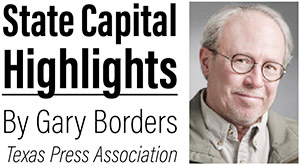Battleship Texas is last surviving dreadnought
 On May 18, 1912, the USS Texas, also known as Battleship Texas, launched and quickly became one of the most powerful weapons in the world. It is credited with the introduction and innovation of advances in gunnery, aviation and radar. She is the last surviving Dreadnought and the only battleship in existence today that fought in both World War I and World War II.
On May 18, 1912, the USS Texas, also known as Battleship Texas, launched and quickly became one of the most powerful weapons in the world. It is credited with the introduction and innovation of advances in gunnery, aviation and radar. She is the last surviving Dreadnought and the only battleship in existence today that fought in both World War I and World War II.
Here are five things happening around your state:
New fund to support creation of more state parks passes House
Senate Bill 1648 and Senate Joint Resolution 74, authored by Sen. Tan Parker and sponsored by Rep. Armando Walle, both passed the Texas House this week and are on their way to the governor for his signature. With voter approval, the bills together would create a Centennial Parks Conservation Fund and invest $1 billion to buy more land to create new state parks and maintain existing parks. The fund will grow with interest over time to continue growing the park system. Texas Parks and Wildlife is celebrating 100 years of state parks this year, a fitting time to dedicate this fund. This November, voters in Texas will have the opportunity to approve the new constitutionally dedicated fund.
Name, image andlikeness update bill passes Senate
This week the Senate passed House Bill 2804, authored by Rep. John Kuempel and sponsored by Sen. Brandon Creighton. This bill continues the work from last session when the legislature established a name, image and likeness law in Texas. HB 2804 keeps Texas competitive in the NIL space by allowing college athletes to profit using the school’s trademark if the school approves and charges a market rate for its use. Additionally, the bill allows universities to help student athletes entering NIL contracts and maintains confidentiality of related information. As the NIL space continues to evolve and develop, it is imperative that Texas universities continue to be competitive and create a welcome environment for student athletes to thrive.
Senate Bill 15 passes House, goes to governor’s desk
The Texas House passed Senate Bill 15 this week, sending it to the governor for final approval. The bill, authored by Sen. Mayes Middleton and sponsored by Rep. Valoree Swanson, protects women’s sports at the collegiate level by requiring athletes to compete in competitions based on biological sex. In recent years, concern over biological males competing against biological females in interscholastic events have been highlighted in various instances, particularly at the NCAA women’s swimming championship. Allowing men to compete against women is unfair to women and takes opportunities away from deserving women who otherwise could have competed at that level. The bill does have allowances for women to participate in athletic programs for men that do not have a corresponding team available to them, such as football. During the third called special session of the 87th Legislature, the Texas Legislature passed a bill protecting women’s sports at the elementary and high school levels. This year, we continue that work to protect women’s sports at the collegiate level.
Senate passes sales tax exemption for certain family care items
Sen. Joan Huffman authored Senate Bill 379, which passed the Senate this week. The bill would give a sales tax exemption for wound care dressings, adult or children’s diapers, baby wipes, feminine hygiene products, maternity clothing, baby bottles and breast milk pumping products. These items are all essential for women and families – whether welcoming new family members or caring for elderly family members. Giving a tax break for essential items alleviates what some have deemed “the pink tax.” The measure would save taxpayers over $100 million a year.
T.L.L. Temple Foundation invests in CDL program at Lamar State College Port Arthur
This year, Lamar State College Port Arthur sought to significantly expand their commercial driver’s academy and examination facilities. LSCPA secured a grant from the Economic Development Administration, acquired land in Jefferson County, and funds from the Governor’s Emergency Education Relief program to expand the program. However, last minute costs required an infusion of funds and the Temple Foundation stepped in. The program was able to increase enrollment from 185 to 230 enrollees and will surpass 300 in coming years. Hundred of Texans will graduate from this program and immediately start careers as drivers with well-paying income.
Sen. Robert Nichols represents Senate District 9, which includes Polk County, in the Texas Legislature.
- Hits: 1617




